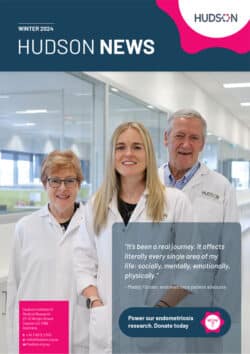Dr Sarah Moody
- Honorary Research Associate, Testis Development and Male Germ Cell Biology
- sarah.moody@hudson.org.au
Dr Sarah Moody is a member of the Testis Development and Male Germ Cell Biology Research group in the Centre for Reproductive Health.

Areas of interest
Research group
Testis Development and Male Germ Cell Biology
Biography
Dr Sarah Moody is an Honorary Research Associate working with Professor Kate Loveland in the Testis Development and Male Germ Cell Biology laboratory.
Dr Moody completed a Bachelor of Biomedical Science (Honours) at Monash University in 2012.
Following two and a half years of experience as a research assistant, she commenced her PhD in 2016 under the supervision of Professor Kate Loveland, co-supervised by Associate Professor Patrick Western.
Dr Moody completed her PhD in 2020 with her thesis entitled “Investigating the effects of activin A and TGFbeta superfamily ligands on the fetal male germline”.
Her current research continues to expand on understanding the role of activin A and TGFbetas on the fetal male germline and developing testis.
Publication highlights


